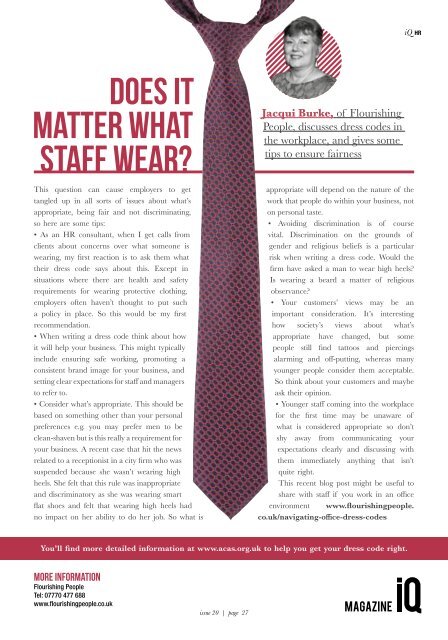IQ Magazine Issue 20
Sharing business intelligence throughout Cambridgeshire and Suffolk.
Sharing business intelligence throughout Cambridgeshire and Suffolk.
Create successful ePaper yourself
Turn your PDF publications into a flip-book with our unique Google optimized e-Paper software.
iQ HR<br />
Does it<br />
matter what<br />
staff wear?<br />
Jacqui Burke, of Flourishing<br />
People, discusses dress codes in<br />
the workplace, and gives some<br />
tips to ensure fairness<br />
This question can cause employers to get<br />
tangled up in all sorts of issues about what’s<br />
appropriate, being fair and not discriminating,<br />
so here are some tips:<br />
• As an HR consultant, when I get calls from<br />
clients about concerns over what someone is<br />
wearing, my first reaction is to ask them what<br />
their dress code says about this. Except in<br />
situations where there are health and safety<br />
requirements for wearing protective clothing,<br />
employers often haven’t thought to put such<br />
a policy in place. So this would be my first<br />
recommendation.<br />
• When writing a dress code think about how<br />
it will help your business. This might typically<br />
include ensuring safe working, promoting a<br />
consistent brand image for your business, and<br />
setting clear expectations for staff and managers<br />
to refer to.<br />
• Consider what’s appropriate. This should be<br />
based on something other than your personal<br />
preferences e.g. you may prefer men to be<br />
clean-shaven but is this really a requirement for<br />
your business. A recent case that hit the news<br />
related to a receptionist in a city firm who was<br />
suspended because she wasn’t wearing high<br />
heels. She felt that this rule was inappropriate<br />
and discriminatory as she was wearing smart<br />
flat shoes and felt that wearing high heels had<br />
no impact on her ability to do her job. So what is<br />
appropriate will depend on the nature of the<br />
work that people do within your business, not<br />
on personal taste.<br />
• Avoiding discrimination is of course<br />
vital. Discrimination on the grounds of<br />
gender and religious beliefs is a particular<br />
risk when writing a dress code. Would the<br />
firm have asked a man to wear high heels?<br />
Is wearing a beard a matter of religious<br />
observance?<br />
• Your customers’ views may be an<br />
important consideration. It’s interesting<br />
how society’s views about what’s<br />
appropriate have changed, but some<br />
people still find tattoos and piercings<br />
alarming and off-putting, whereas many<br />
younger people consider them acceptable.<br />
So think about your customers and maybe<br />
ask their opinion.<br />
• Younger staff coming into the workplace<br />
for the first time may be unaware of<br />
what is considered appropriate so don’t<br />
shy away from communicating your<br />
expectations clearly and discussing with<br />
them immediately anything that isn’t<br />
quite right.<br />
This recent blog post might be useful to<br />
share with staff if you work in an office<br />
environment www.flourishingpeople.<br />
co.uk/navigating-office-dress-codes<br />
You’ll find more detailed information at www.acas.org.uk to help you get your dress code right.<br />
More Information<br />
Flourishing People<br />
Tel: 07770 477 688<br />
www.flourishingpeople.co.uk<br />
issue <strong>20</strong> | page 27

















